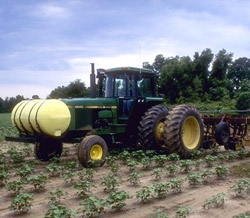According to the Ministry, there are more than 300 people involved in selling licensed pest-killers. The number of unlicensed sellers exceeds by ten times. Basically, the people doing business are just ordinary people and they are doing that in poor sanitary conditions. Recently, the Ministry of Agriculture set a regulation for registering and giving licenses to sellers and presented it to the government. Until the government’s decision, sellers will continue to sell pest-killers.
“There have always been defects in selling the pest-killers,” says head of the Agricultural Economy department of the Ministry Garnik Petrosyan. “That is why many farmers are disappointed in the quality of the products. People are selling the pest-killers in garages, streets, in the home, different places.”
Farmers complain that the products are not effective. Sometimes they even complain that the plant has been damaged or burned. There have been cases when the villager has lost all of his crop, but has not been able to defend his rights and prove that the reason was the pest-killer. According to G. Petrosyan, most of the time the sellers are not specialists and can’t explain to the consumer how to use the product. There are cases when the product’s expiration date has passed. This is why the Ministry of Agriculture wishes to improve the market.
“The Ministry of Agriculture plans on presenting its demands to the market,” says G. Petrosyan. “Besides providing hygienic conditions, it is very important that the pest-killers be sold with brand names, the consumer must have side labels showing how to use the product and how much. After all, it’s poisonous. There has to be a certificate given with each pest-killer sold. We want specialists to sell the products so that they can solve any problems that arise. We consider the material found in the pest-killer as a standard. In many cases, the material is in the pest-killer, but later we find out that it didn’t do its job. We research and see that the substances in the prepared pest-killer do not correspond. That is why the seller has to be a specialist.”
The Ministry of Agriculture has also decided to make a list of the imported pest-killers. There is a special committee which examines the substance and then allows imports. The committee consists of the Ministries of Agriculture, Health and Ecology and specialists from the National Academy of Sciences. Currently, there are approximately 190 brand name pest-killers in Armenia. When taking the substance, certain documents are presented and there is no laboratory examination conducted. G. Petrosyan assures that the documents are enough for the committee to get a picture of what kind of substance it is dealing with. The importer pays no fine for importing the product as in the case of drugs. However, committee members have started to complain about not getting paid and most probably the Ministry will fix amounts to be paid after it regulates the market. When the pest-killers get licensed and the market is regulated, it is quite possible that the same there will be some changes just like there were changes in the drug market. A couple of years ago, the drug market was monopolized and, as a result, small and medium importers were left out of the game. The price of drugs went up when there was barely any competition. It is very possible that the same will happen with pest-killers and one of our oligarchs or MPs will consider this market profitable and will privatize it. But then again, we have a committee controlling the levels of competition and that committee will do some research and then tell us that competition in Armenia is based on equality.

